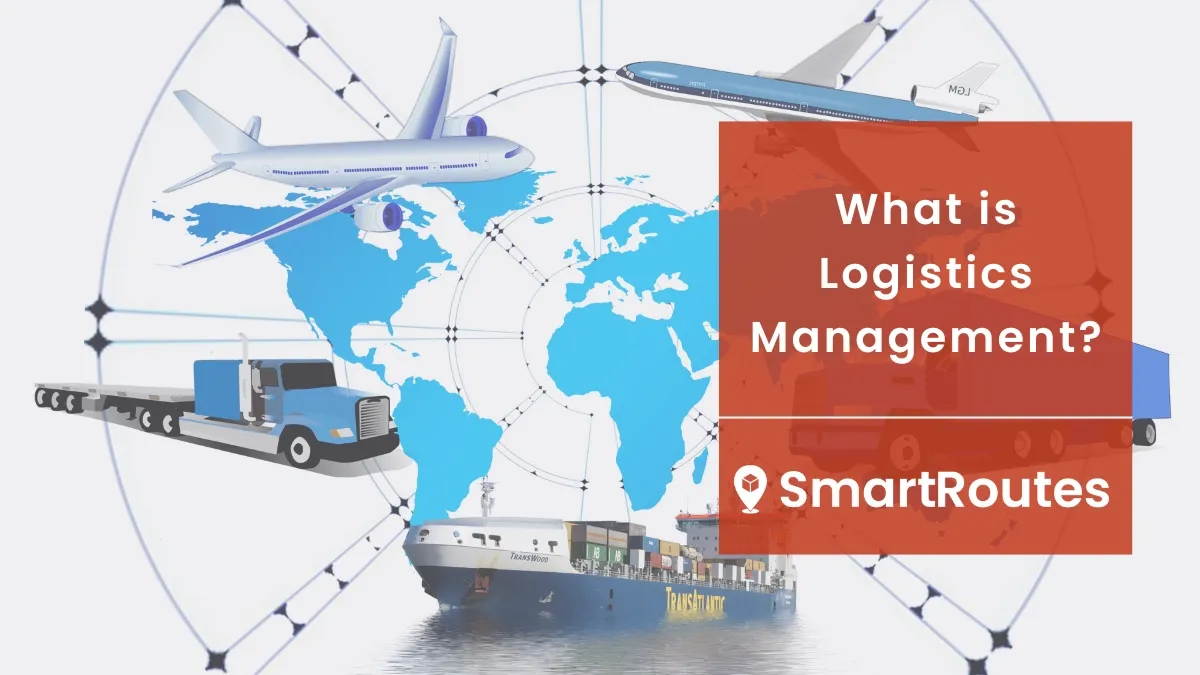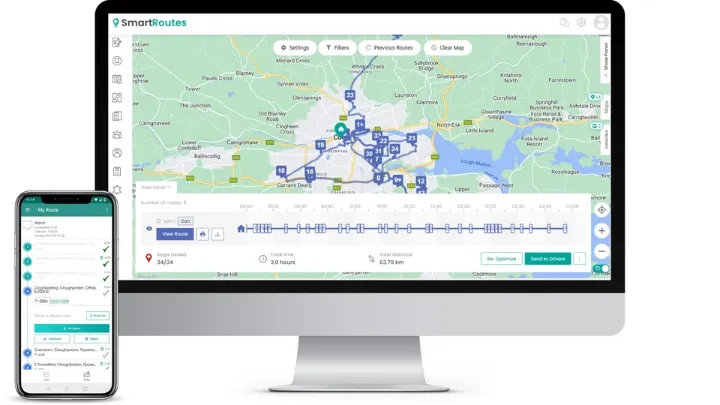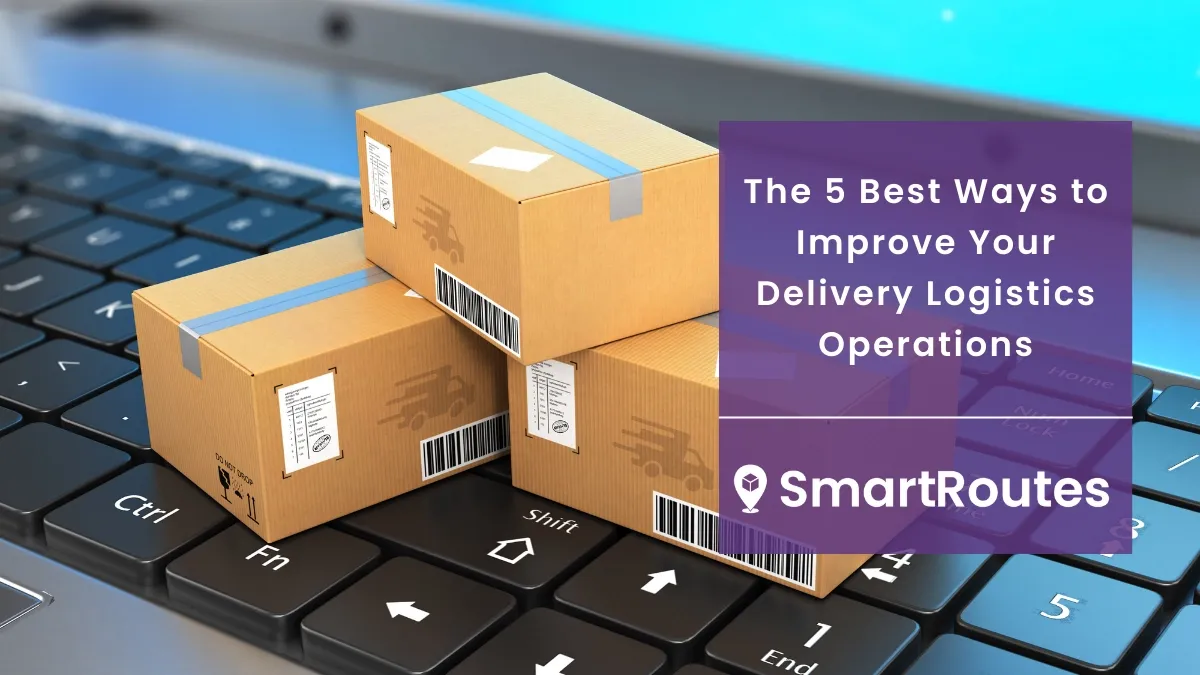What is Logistics Management?
Logistics management refers to the part of the supply chain where goods, services, other materials etc. are received (inbound) and distributed (outbound).

When we think of ‘logistics’ there’s a tendency to think of it as a catch-all term to describe all modes of commercial transport. Shipping, road haulage, and supply chain are all elements that we might think of, but logistics management is a little more focused than it might seem.
To wrap our heads around it, we're going to look at our own definition of what logistics management entails. We’ll also take a closer look at some of the different aspects of the management of logistics, and break down the day-to-day duties of a typical manager's role.
If you’re a transport business owner looking to gain more insight, or if you’re a business owner that is trying to improve their logistics management portion of their business, this guide should provide some valuable insights.
Why is the logistics management process important?
So, how is it different from supply chain management?
What does a logistics manager do?
5 keys to success for logistics success
SmartRoutes Logistics Management Solutions
What is Logistics Management?
Logistics management refers to the part of the supply chain where goods, services, other materials, etc. are received (inbound) and distributed (outbound).
It forms an integral part of any organization that produces physical goods that need to be distributed to customers, and the overall success of many businesses hinges on robust logistics operations. More than any other area of a business, logistics plays a critical part in satisfying the end customer and ensuring long-term success.
Where confusion can emerge in understanding what logistics management really is, is when we look at it as a clearly defined and universal set of tasks within businesses. The reality is, that the term is more of a ‘catch-all’ definition for a whole host of business operations related to the receiving, storing, and distribution of goods.
Depending on the type, size, industry etc. of any one business, logistics management can include (but not limited to) such functions as:
- Warehousing
- Stock Management
- Shipping
- Fleet Management
- Inventory Management
- Route Planning & Scheduling
While some B2C companies will have dedicated logistics teams that handle the receipt and distribution of their own products and services, others will opt to outsource the logistics process to third-party transport providers.
SmartRoutes Route Planning Software
Streamline your entire delivery process, all from one platform

Why is the logistics management process important?
As mentioned above, getting your logistics working effectively and efficiently can be a make-or-break for any business. In short, any inefficiencies in the process can lead to products arriving late to your customer. Once your customer is impacted by your logistics process and they see it in their bottom line, you can be certain they’ll look elsewhere for a provider that has their affairs in order.
Whether that’s as a third-party (3PL) provider of logistics as a service to a manufacturer, or you’re distributing your own products doesn’t matter. Late is late in the world of business, and late means an impact on your overall profitability.
Ultimately, that’s what makes the logistics process within a business one of, if not the most important business function for any business that has physical goods at the core of what they do. The knock-on effects on other important parts of the business such as customer experience and revenue predictability all rely on having a well-oiled logistical system.
While being proactive in your approach to transport and logistics can be beneficial, the same is true for acting in a reactive manner to tasks in the process. Late deliveries, damaged and missing products, unnecessary waste of inventory and inefficient fleets can all greatly impact any business' viability. While acting to remedy such issues when they occur is a necessity, taking steps to ensure that they don’t happen at all is even more important if you're going to grow and scale a business effectively.
Increasingly, sustainability is also playing a leading role in the need for businesses to bring more control to their logistical operations too. With more spotlight on environmental factors, both consumers and governments around the world are looking to businesses to become more aware of their environmental impact.
And with the US, EPA identifying transportation as the biggest emitter of greenhouse gasses, many businesses are aware that they will need to prove their logistical efficiency is in line with government regulations.
So, how is it different from supply chain management?
There is sometimes a tendency to conflate the two terms together, however, logistics management is a standalone function within the wider supply chain system.
Think of it this way:
A computer is assembled in a factory in Asia but the individual parts like the outer case, CPU, and cooling fan of the computer must first be shipped to the factory from an individual manufacturer. Once the computer is assembled, it is shipped to a designated country where a central distributor must send it to an electronics store. Once the electronics store sells the computer online, it needs to be delivered to the customer that bought it (last mile delivery).
This process is what we refer to as the supply chain.
Within that process, the distributor that received the computer from the manufacturer in Asia needs to manage a warehouse with many other products, and send them to all his clients that buy computers from them. This will typically involve receiving them and storing the goods, keeping them in good condition while being easy to access, and being able to send them to customers in an efficient manner once they receive an order.
This individual stage or ‘link’ in the wider supply ‘chain’ is what we refer to as logistics management.
That’s not to say that the manufacturer in Asia is not involved in logistics management. It’s just that they have an entirely separate logistics process within the broader supply chain.
The explosion in eCommerce in recent times, also means that ensuring that customers can return unwanted items has been added to the function of logistics teams in what is referred to as reverse logistics.
What does a logistics manager do?
The day-to-day duties of a logistics manager can vary depending on the specifics of the business they work for, but typically include the oversight of everything entailed in the inbound and outbound logistics operations. This will include making sure the correct goods are received by the company, that they are stored appropriately in the warehouse or depot, and that they are dispatched in an efficient, safe and satisfactory manner.

For those involved in reverse logistics, they will also be responsible for returns.
No two logistics managers day-to-day duties will be the exact same, and often they’re main task will be the oversight of a team of line managers that fulfill individual functions in the delivery logistics planning process.
Below, we take a look at what some of these types of middle-management roles and what they entail.
5 different management roles that can form a logistics team
Warehouse Manager
Warehouse managers are responsible for ensuring the smooth operation of a central storage facility where inbound goods are stored and distributed effectively. Essentially, they are responsible for everything that happens within the building, from people to goods.
Included in the responsibilities can be inventory management, property management, process optimization, and record-keeping.
Distribution Manager
Distribution managers play a more specific role than logistics managers. Unlike general warehouse managers, their core focus is on getting goods outbound from the central location to the next point in the supply chain.
As part of their role, the duties will often include transport management and coordination, order fulfillment, wider supply chain management and reporting on delivery success.
Fleet Manager
For larger operations, the management of the business's fleet delivery vehicles will be designated as an individual role within the logistics team.
As the business's most important asset, the fleet needs to be road-worthy, meet safety compliance regulations, and have regular testing done to a strict schedule. On a business scale, this is often beyond the scope of a logistics manager, and someone with experience with fleets is brought on board to manage all the tasks related to the upkeep of the vehicles.
Route Scheduler
In some logistics businesses, the task of route scheduling will be done by the distribution manager, but as the business scales, a route scheduler will be hired to plan the delivery routes and transportation for all the vehicles and drivers.
For large fleets, having a dedicated route planner can save the business large amounts of money by having optimized routes, and saving on driver wages, fuel, and missed deliveries. Route schedulers will usually have experience in managing routes for larger fleets and be proficient in the use of route scheduling software.

Transport Shift Manager
When fleets become bigger, so too does the team of drivers required to man them. It also means that your vehicles will run 24 hours a day and need support from someone on a constant basis.
Once a transport and logistics business gets to this size, it will require transport managers to work ‘shifts’ to cover all the hours of the week. The duties of shift managers can vary depending on the type of business but usually encompass many of the same duties of a logistics manager in a larger business. Skills like problem-solving and leadership can be as important to shift managers as hard skills like dispatching and routing given that they are likely to work across different teams of drivers and colleagues.
5 keys to success for logistics success
An efficient logistics process is dependent on the building blocks set out by the senior management. Without senior management laying this groundwork, efforts can become disjointed and make life more difficult for employees, and more costly to the company's bottom line.
Below, we set out some of actionable tips to master the logistics management function:
Hire for experience in the specific functions of your logistics process
As we’ve already highlighted, modern logistics management encapsulates a huge range of functions across various businesses.
For that reason, not every logistics manager is going to have the same set of skills and experience. This makes it vital that you assess your candidates accordingly before hiring, and make sure that they have the required experience to make their career at your business successful.
However, there are some basic competencies that you will want to look for;
A background in analytics and experience with a comparable logistics software suite to the one you have implemented should be a starting point. While in the past the role of a transportation professional required a lot of paperwork, the modern logistics manager needs to have digital proficiency and be able to use software that automates many of the previously time-consuming tasks like route planning, fleet tracking, inventory control, and project management.
Identify the day-to-day duties before you conduct an interview, and look for the candidate that has experience in each.
Document the management process
While it’s not desirable, the reality is that employees move between jobs much more frequently compared to even a decade ago, and having a documented process allows you to continue previous processes with minimal disruption to operations.
While the life cycle of employee turnover isn’t something you can control, your standard process is.
Again, a comprehensive software package should be able to capture data and have a space for documenting and supporting processes.
Train and share knowledge with staff
Ensuring that your employees have the required knowledge of both your business and their role is critical to the success of a transportation business.
Knowing how everything works and being able to complete tasks with full proficiency is the key to getting everything moving efficiently and will make or break your business. This comes down to onboarding everyone and making them familiar with the processes that are already established.
Again, having a software solution in place where knowledge is centralized for every employee will ensure that everyone in the business is working towards the same set of objectives. Having a policy that everyone is familiar with is also a prerequisite for any successful team.
Open communication systems
Last but not least, having open communication between logistics, drivers, and admin staff will be crucial to success.
Unlike any other business, the need for open communication is dictated by the fast-moving, multi-layered activities of a transportation team. As inventory and products move around a warehouse, it is critical that everyone knows where everything is at any given time.
Having a software solution in place that allows everyone to communicate openly back and forth helps to cut down on unnecessary mistakes and avoid conflict between different parties. While it is usually part of a logistics software package, sometimes tools like Slack or Microsoft Teams are suitable in larger organizations as part of a wider ERP system.
Building a logistics team
Logistics management is a key part of the success of any business that handles physical goods. Regardless of the size of the business, having a process in place, and employees with the right experience is the key to keeping everyone from your staff to customers happy, and enduring that your business maximizes profits.
If you’re in the process of establishing a logistics team or making your first logistics management hire, we hope this guide will give you some food for thought.
SmartRoutes Logistics Management Solutions
At SmartRoutes, we’re dedicated to providing the best logistics route planning solution possible.
We helped businesses like Transvalair unify their route planning, fleet tracking, and order management in one easy to use software solution.
Our cloud-based software is quick to implement and easy to configure to the needs of your business.
Get in touch with us today to see how we can help with your logistics challenges.
Frequently asked questions
1. What Is the Role of Logistics Management in Supply Chain Management?
Logistics management plays a crucial role in supply chain management by overseeing the movement, storage, and distribution of goods from the point of origin to the point of consumption. It ensures efficient coordination of all supply chain activities.
2. What Are the Key Components of Logistics Management?
Logistics management comprises several key components, including transportation, inventory management, warehousing, order processing, and demand forecasting. These elements work together to optimize the flow of goods and reduce operational costs.
3. How Does Efficient Logistics Management Benefit Businesses?
Efficient logistics management can benefit businesses in various ways, such as reducing transportation costs, improving customer satisfaction, minimizing inventory holding costs, and enhancing overall operational efficiency. It can also help businesses respond more effectively to market fluctuations.
4. What Are the Common Challenges in Logistics Management?
Common challenges in logistics management include supply chain disruptions, demand variability, rising transportation costs, and the need for sustainability and green logistics. Overcoming these challenges is essential for maintaining a competitive edge.
5. What Technologies Are Transforming Logistics Management?
Technology is playing a significant role in transforming logistics management. Innovations such as GPS tracking, route planning software, warehouse automation, and advanced analytics are helping companies optimize their logistics operations, increase visibility, and make data-driven decisions.
If you enjoyed this blog, you might also be interested in:








